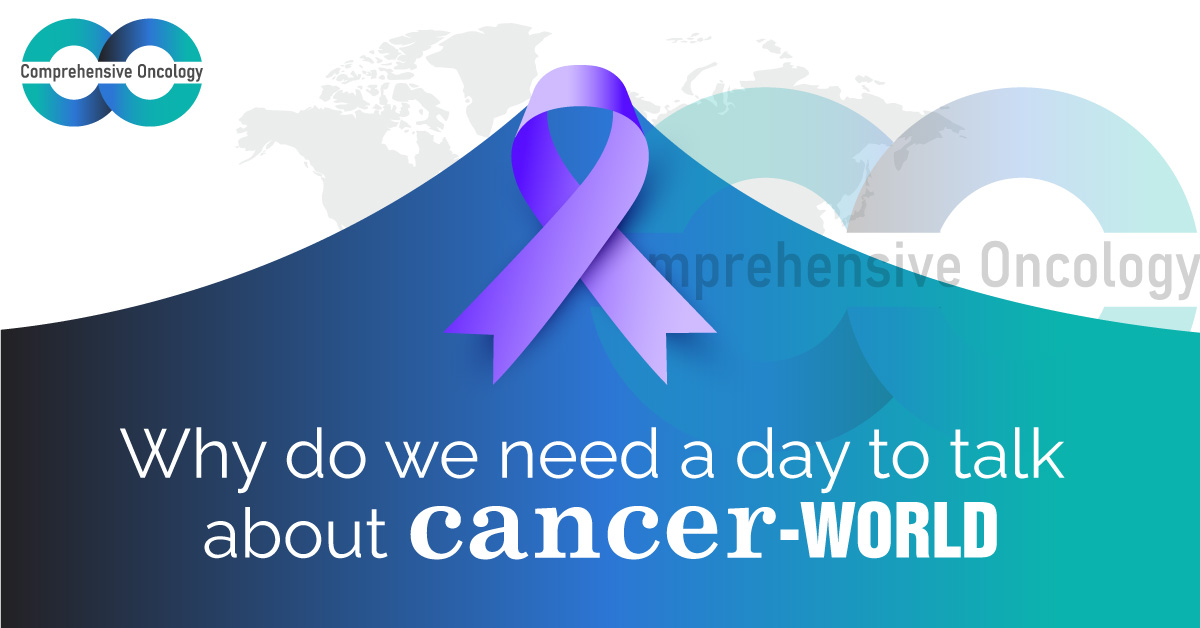- Mon-Sat (9am - 5pm)
- Aditi_aggi@yahoo.com
- +91-7982047515

4th February is celebrated as the World Cancer Day across the world with an aim to spread awareness for cancer. Though we all talk of staying positive all the time, you may think as to why we should be talking about a disease like Cancer!!!
It is important for us to understand that the number of cancer patients diagnosed every year are increasing across the world, and India is no different. This is happening because of the changes in our lifestyle, changes in our environment including air and water, the food that we eat, and also because with advancement in science and technology, more of early cancers are being picked up. With the incidence increasing, WHO has already declared it an epidemic.
Now you must be thinking as to what is the need to know that…So, the good news is that upto 60% of cancers are preventable and we can prevent them by just adopting a healthy lifestyle, knowing our body and few warning signs your body may give.
WHO has marked a day in the year to spread this awareness, though the task cannot be limited to a day only. The Slogan this year is CLOSE THE CARE GAP….which means we are trying to eliminate the gaps in cancer care……gaps in awareness…….gaps in early detection……..gap in treatment by making cancer care available to all irrespective of the social status, age or race.
So, on this world cancer day, let us all take a pledge by doing our bit in closing this gap…Staying aware of yourself and spreading awareness about the disease is the first step on this Journey..
Stay Aware…Stay Empowered!!!!
Dr. Aditi Aggarwal has worked in radiation oncology for ten years, treating patients with thoracic cancer, gastrointestinal cancer, bone and soft tissue cancer, gynecological cancer, breast cancer, and neurological cancers.
As a medical doctor, Dr. Aditi Aggarwal holds an MBBS degree from Lady Hardinge Medical College Delhi, a MD degree in radiation oncology from VMMC and Safdarjang Hospital Delhi, as well as a post-doctoral diploma in cancer research from Catalyst Clinical Sciences in Pune.
Cancer is usually classified into four stages, with stage 0 being the earliest stage and stage IV being the most advanced. The stage of a cancer is an important factor in determining the prognosis and the best treatment options. Here's a brief overview of the different stages of cancer:
Stage 0: This is the earliest stage of cancer, and it refers to cancer that is still in its original place and has not spread to other parts of the body. It is also known as carcinoma in situ.
Stage I: This stage means that the cancer is still small and has not spread to other parts of the body. It may be treatable with surgery or other local treatments.
Stage II: At this stage, the cancer is larger and may have spread to nearby lymph nodes. It may be treated with surgery and/or radiation therapy, or other systemic treatments such as chemotherapy.
Stage III: This stage means that the cancer has spread to nearby tissues or organs and/or to distant lymph nodes. Treatment may involve a combination of surgery, radiation therapy, and/or systemic treatments such as chemotherapy.
Stage IV: This is the most advanced stage of cancer, and it means that the cancer has spread to other parts of the body, such as the liver, lungs, bones, or brain. Treatment at this stage is typically palliative, meaning that it aims to relieve symptoms and improve quality of life, rather than cure the cancer.
It's important to note that the staging of cancer can vary between different types of cancer and different systems used to classify the stages. Your healthcare provider can give you more information specific to your situation.
There is no single vaccine that can prevent or cure all types of cancer. However, some vaccines can help prevent certain viral infections that can increase the risk of certain cancers, such as the human papillomavirus (HPV) vaccine, which can help prevent HPV-related cancers such as cervical, vaginal, vulvar, and anal cancer.
Additionally, some cancers can be treated with a type of immunotherapy called cancer vaccines, which help stimulate the body's own immune system to recognize and attack cancer cells. These vaccines are still in the experimental stage and are only available through clinical trials.
However, there are many things you can do to reduce your risk of developing cancer, such as eating a healthy diet, maintaining a healthy weight, avoiding tobacco products, and getting regular cancer screenings. Your healthcare provider can give you more information on how to reduce your risk of cancer.
The symptoms of cancer can vary depending on the type and part of the body of cancer, as well as its stage. Some common symptoms of cancer include:
It's important to keep in mind that these symptoms can also be caused by other conditions, and not all of them are present in all cases of cancer. If you are experiencing any symptoms that are new or persist for a long time, it's important to talk to your healthcare provider to determine the cause and get appropriate medical attention. Early detection and treatment of cancer can often lead to better outcomes.
Through us, you can schedule a Dr. Aditi Aggarwal priority appointment. Request a callback or dial 7982047515 to reach us.